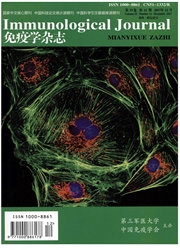

 中文摘要:
中文摘要:
Th17细胞是CD4~+T细胞亚型之一,可分泌IL-17等炎性因子,诱导机体多种疾病。幽门螺旋杆菌(Helicobacter pylori,Hp)感染后,Cag A及Ure B等可影响Th17细胞数量,其机制可能与被感染的巨噬细胞直接诱导细胞分化、激活MyD88等信号通路及趋化因子的趋动有关,最终Th17、Treg细胞数量均较感染前增多,Th17/Treg平衡紊乱,总体向Treg漂移;同时,增多的Th17细胞一方面可通过募集中性粒细胞等参与Hp的清除,另一方面又扩大炎症反应,引起黏膜损伤甚至诱导癌变,从而在Hp感染的免疫应答中扮演着重要角色,参与胃炎、消化性溃疡、胃癌等Hp相关性疾病的发生发展。
 英文摘要:
英文摘要:
Th17 ceils are one of the CD4+ T cell subsets, inducing varieties of diseases by secreting IL-17 and other inflammatory factors. After H. pylori infection, CagA and UreB regulate the volume of Th17 cells via inducing cell differentiation by infected-macrophages, activating MyD88 and other pathways, and migrating of chemokines. Thus the volume of both Th17 cells and Treg cells are upregulated, and the Th17/Treg balance switches towards a Treg type immune response. Meanwhile, Th17 cells also play important roles in the response of H.pylori infection, participating in the clearence of H.pylori by recruiting neutrophils and expanding inflammatory response, causing mucosal damage and even inducing cancer. Thereby Th17 cells participate in the occurrence and development of H. pylori-related diseases such as gastritis, peptic ulcer and gastric cancer.
 同期刊论文项目
同期刊论文项目
 同项目期刊论文
同项目期刊论文
 期刊信息
期刊信息
